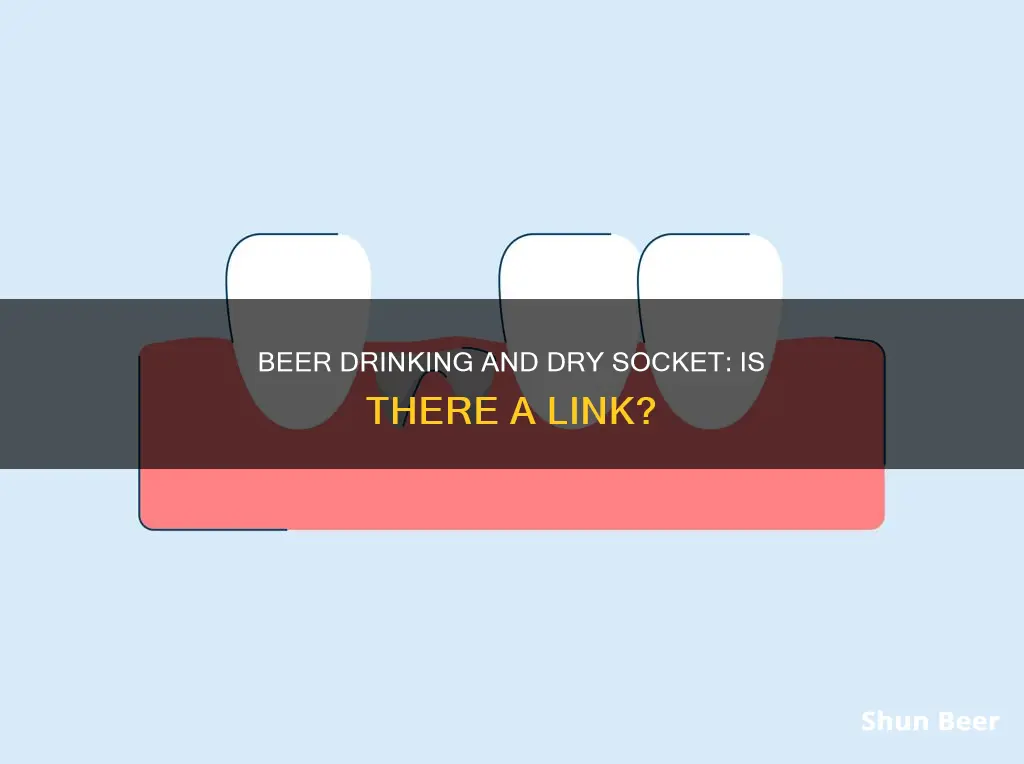
Drinking beer or any other alcoholic beverage after a tooth extraction is not recommended by dentists. Alcohol can hinder the recovery process and cause complications such as pain, infection, and dry socket. Dry socket is a painful condition that occurs when a blood clot over the wound is dislodged, exposing the nerves and bones underneath. Alcohol has a blood-thinning effect, which can prevent clot formation and lead to dry socket. It is generally advised to avoid alcohol for at least 72 hours, and ideally for 7 to 10 days, to allow the extraction site to heal and the blood clot to form completely.
| Characteristics | Values |
|---|---|
| Can drinking beer cause dry socket? | Yes, drinking beer can cause dry socket. |
| Why does drinking beer cause dry socket? | Beer thins the blood, which can prevent clotting and expose nerves and bones in the socket, leading to infection. |
| How long should you wait to drink beer after a tooth extraction? | It is recommended to wait at least 72 hours, but ideally 7-10 days, to allow the blood clot to form and the extraction site to heal. |
What You'll Learn
- Alcohol thins the blood, which can prevent clotting and cause dry socket
- Drinking alcohol after a tooth extraction can expose nerves and bones, leading to infection
- Mixing alcohol with pain medication can be dangerous and cause liver failure, impaired motor function and dizziness
- Alcohol can dehydrate you, hindering recovery
- It is recommended to wait at least 72 hours after a tooth extraction before consuming alcohol

Alcohol thins the blood, which can prevent clotting and cause dry socket
Alcohol can indeed cause dry socket after a tooth extraction. This is because alcohol thins the blood and prevents clotting, which is an essential part of the healing process.
How Alcohol Prevents Clotting
Research has found that alcohol affects the process of blood coagulation. When an injury occurs, blood cells called platelets rush to the site and clump together to form a plug and stop the bleeding. This process is called "coagulation". Alcohol reduces the number of platelets in the blood by interfering with blood cell production in the bone marrow. It also makes the platelets less sticky, which means they are less able to clump together and form a clot.
How This Can Cause Dry Socket
When a tooth is removed, a blood clot needs to form over the extraction site so that the mouth can heal properly. The clot shields nerves and prevents bacteria from forming. A dry socket occurs when the clot over the wound is dislodged, exposing the underlying nerves. As alcohol prevents the blood from clotting, drinking after a tooth extraction could prevent a clot from ever forming, leading to a dry socket.
Risks of Dry Socket
Dry socket is a painful condition that can leave the bones and nerves near the extraction site vulnerable to bacterial infection, which can slow down the healing process and cause further complications.
How to Prevent Dry Socket
To prevent dry socket, it is important to follow your dentist's advice after a tooth extraction. This may include not drinking alcohol for at least 72 hours, or even up to seven to 10 days, to allow the wound to close.
Beer and Non-Alcoholic Beer: Can They Mix?
You may want to see also

Drinking alcohol after a tooth extraction can expose nerves and bones, leading to infection
Drinking alcohol after a tooth extraction is not recommended by dentists, as it can cause several complications that may prolong your recovery. One of the most common complications is dry socket, a painful condition that occurs when the blood clot over the extraction site is dislodged, exposing the underlying nerves and bones. This can lead to severe pain and bleeding and leaves the extraction site vulnerable to bacterial infection, further slowing down the healing process.
To understand how alcohol can cause dry socket, it is essential to know the healing process after a tooth extraction. Within 24 hours of a tooth being pulled, the empty socket fills with blood, leading to the formation of a blood clot. This clot is crucial as it shields the nerves and bones in the socket and prevents bacterial growth. Within 48 to 72 hours, the body's immune system kicks in, reducing the risk of infection and promoting the formation of firmer tissues to replace the blood clot. Within two weeks, the socket starts filling with new blood vessels and bone-forming cells, and by four weeks, the temporary bone is replaced with mature bone, and the wound is fully healed.
Alcohol consumption during the early stages of healing can disrupt this process. Firstly, alcohol is an oral irritant that can inflame tissues and reduce saliva production, making it harder for clots to form and increasing the risk of prolonged bleeding. Secondly, research suggests that alcohol has a blood-thinning effect, which can prevent a clot from forming in the first place. Without a protective blood clot, the nerves and bones in the socket are exposed, leaving them vulnerable to infection.
To prevent dry socket and promote healing, dentists recommend avoiding alcohol for at least 72 hours, if not seven to ten days, after a tooth extraction. During this time, it is important to follow your dentist's aftercare instructions, maintain good oral hygiene, and stay hydrated by drinking plenty of water.
Beer and Harvoni: Safe Mix?
You may want to see also

Mixing alcohol with pain medication can be dangerous and cause liver failure, impaired motor function and dizziness
Mixing alcohol with pain medication can have serious consequences for your health. Alcohol can increase the intensity of side effects from medication, such as drowsiness, dizziness, impaired motor function, and loss of coordination. It can also cause internal bleeding, heart problems, and breathing difficulties. In addition, alcohol may reduce the effectiveness of medication or make it toxic to your body.
The combination of alcohol and pain medication can be particularly dangerous for older people, as their bodies are less able to break down alcohol, and they are more likely to be taking medication that interacts with it. Women are also more susceptible to alcohol-related damage to organs such as the liver, as alcohol reaches a higher level in their bloodstream compared to men, even when consuming the same amount.
Mixing alcohol with pain medication can lead to liver failure, one of the most severe potential consequences. Liver damage can also be caused by combining alcohol with medications for conditions such as arthritis, cholesterol, and diabetes.
Another serious risk is impaired motor function. This can lead to falls and driving accidents, which may be particularly dangerous for older adults. Mixing alcohol with certain medications, such as those for insomnia, can also increase the risk of fatal overdoses.
To avoid these risks, it is generally advisable to avoid drinking alcohol when taking any medication. If you are unsure, it is important to consult your doctor or pharmacist for personalized guidance.
Beer and Blood Pressure Medicine: Safe Mix?
You may want to see also

Alcohol can dehydrate you, hindering recovery
Drinking alcohol after a tooth extraction is not recommended, as it can slow down your recovery process. One of the main reasons for this is that alcohol is a diuretic, which means it can lead to dehydration. After a tooth extraction, it is important to stay hydrated to support your body's healing process.
Tooth extraction is a major dental surgery, and your body needs time for tissues to heal and come together. Alcohol can dehydrate you, hindering this recovery process. Dentists recommend staying well-hydrated by drinking plenty of water after a tooth extraction. This helps to promote healing and can even aid in pain management.
In addition to dehydration, alcohol also has a blood-thinning effect, which can impact your body's ability to form a blood clot over the extraction site. This blood clot is crucial for protecting the nerves and bones in the socket and preventing infection. If the blood clot does not form or becomes dislodged, it can lead to a condition called dry socket, which is extremely painful and can further slow down the healing process.
To ensure a smooth and speedy recovery, it is best to abstain from alcohol for at least 72 hours after a tooth extraction, with some dentists recommending a wait time of up to 7 to 10 days. During this time, it is important to follow your dentist's aftercare instructions, take any prescribed medications, and stay properly hydrated by drinking water.
Overall, while it may be tempting to reach for a beer or another alcoholic beverage after a tooth extraction, it is important to prioritize your body's recovery process by staying hydrated and avoiding alcohol.
Miscarriage Recovery: Beer and Alcohol Consumption
You may want to see also

It is recommended to wait at least 72 hours after a tooth extraction before consuming alcohol
It is highly recommended that you wait at least 72 hours after a tooth extraction before consuming alcohol. Tooth extraction is a major dental surgery that involves removing a tooth from its socket in the bone. This can be due to an infection, injury, or to make room for orthodontic treatment. After the procedure, your body needs time for the tissues to heal and for blood clots to form.
Drinking alcohol within 72 hours of the procedure can disrupt the healing process and increase the risk of complications. Alcohol is an oral irritant that can cause inflammation and reduce saliva production, making it harder for clots to form and increasing the risk of bleeding. Additionally, alcohol has a blood-thinning effect, which can interfere with clot formation and lead to a condition called dry socket.
Dry socket occurs when the blood clot over the extraction site is dislodged, exposing the underlying nerves. It is a painful condition that can leave the bones and nerves vulnerable to bacterial infection, further slowing down the healing process. The symptoms of dry socket include severe pain and bleeding. Therefore, it is crucial to give your body enough time to heal and recover before consuming alcohol.
To ensure a smooth recovery, it is advisable to follow the instructions provided by your dentist and take any prescribed medications as directed. It is also important to rest for at least 24 hours after the procedure, apply a cold compress to reduce swelling, and avoid vigorously rinsing your mouth, using straws, or smoking for at least 24 hours to prevent dislodging the blood clot.
While it may be tempting to reach for an alcoholic beverage after a tooth extraction, it is in your best interest to wait at least 72 hours, if not seven to ten days, to allow your body to heal properly.
Beer and Prednisone: Is It Safe to Drink?
You may want to see also
Frequently asked questions
Yes, drinking beer can cause dry socket. Dry socket occurs when a blood clot is unable to form or becomes dislodged after a tooth extraction, exposing nerves and bones and making them vulnerable to bacterial infection. As beer is a form of alcohol, it can thin the blood and prevent it from clotting, making dry socket more likely to occur.
Dry socket is a painful condition that can occur after a tooth extraction. It happens when a blood clot is unable to form or becomes dislodged, exposing the nerves and bones in the socket. This can lead to bacterial infections and slow down the healing process.
To prevent dry socket, it is recommended to avoid drinking alcohol, especially beer, for at least 72 hours after a tooth extraction. Dentists recommend waiting for up to 7-10 days to allow the blood clot to form and the extraction site to heal completely. During this time, it is important to stay hydrated by drinking water and following the oral care plan provided by your dentist.
The symptoms of dry socket include intense pain following a tooth extraction, especially after wisdom tooth removal. If you experience excruciating pain accompanied by radiating nerve pain towards your ear, it is important to contact your dentist immediately.







